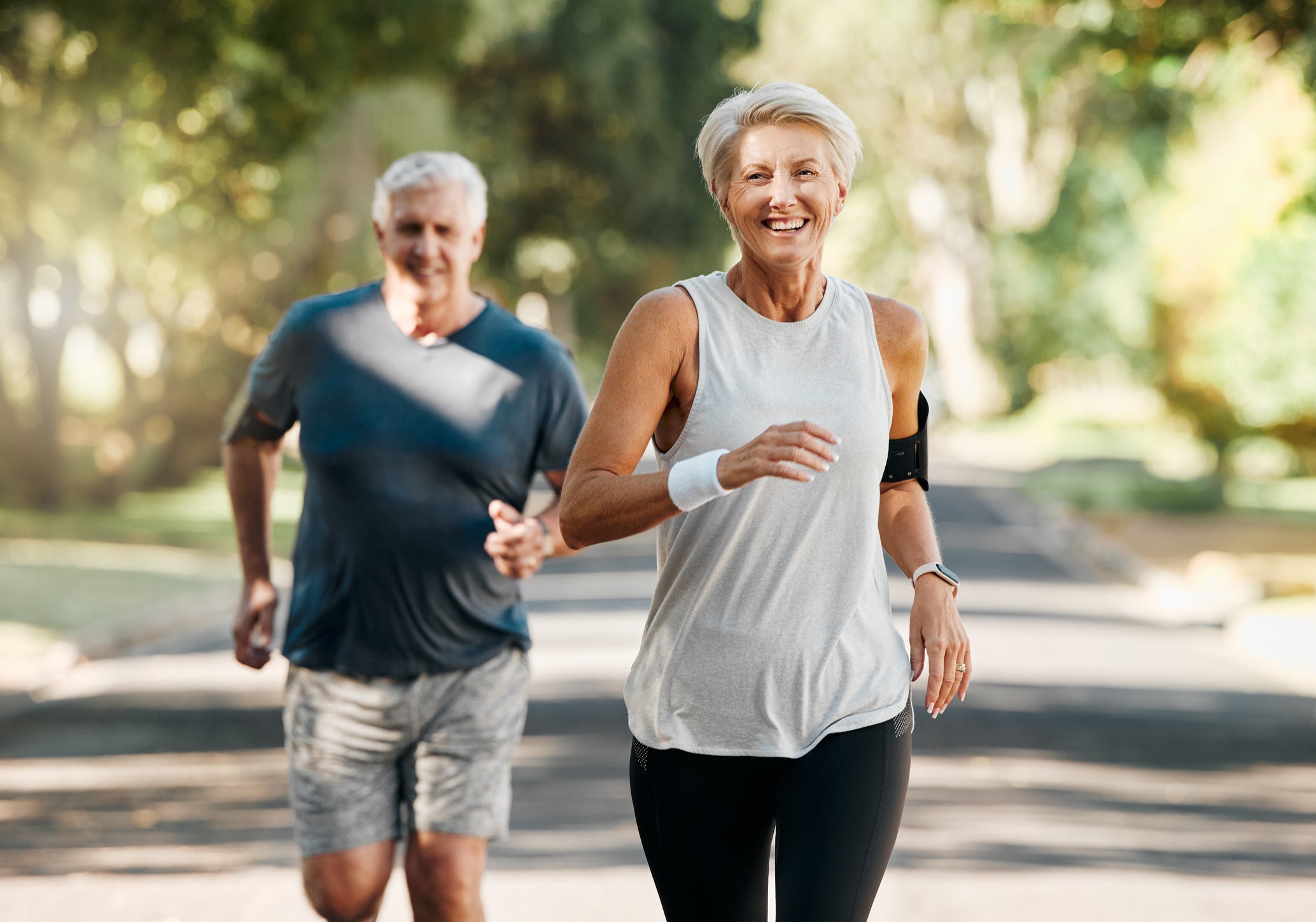Humans experience rapid ageing at 44 and 60 – here’s how to slow it down
Ageing isn’t slow and steady, the latest research shows it comes in spikes and at two significant ages. Having just past her ‘accelerated age’ age Maria Lally, looks at why it happens and what you can do about it


There are many signs you’re well and truly into midlife. The “ooft” you make as you get out of a chair, the occasional grey hair that suddenly becomes a smattering, the tiredness in your face that no amount of face cream or early nights can fix.
So, if you’re in your mid-forties like me, and are puzzled by how you’re feeling older than ever, scientists have just discovered why. Recent research found that ageing isn’t a slow and steady process, but rather it happens in two accelerated bursts: once around the age of 44, and again at 60.
A study from Stanford University in the US looked at people aged between 25 and 75, and found two spikes in ageing that could be responsible for age-related health issues, such as Alzheimer’s disease or musculoskeletal problems, happening at certain times.
“We’re not just changing gradually over time,” says Prof Michael Snyder, a geneticist and director of the Center for Genomics and Personalized Medicine at the university and the study author. “There are some really dramatic changes. It turns out the mid-forties is a time of dramatic change, as is the early sixties.”
According to the researchers, the changes that begin in our mid-forties include our ability to metabolise caffeine, alcohol and carbohydrates, immune regulation, skin and muscle ageing, and an increased risk of heart disease and cognitive decline.
“Around the mid-forties, women hit perimenopause, characterised by a drop in oestrogen that can lead to weight gain, especially around the middle,” says Sam Rice, a nutritionist and author of The Midlife Method: How to Lose Weight and Feel Great After 40.
“No foods can replace those lost hormones, but certain foods can help support hormone balance, such as cruciferous vegetables like sprouts, cabbage, cauliflower, broccoli and kale, which contain something called indole-3-carbinol, a plant chemical known to increase oestrogen metabolism.”
Rice also says we need to eat fewer carbs as we reach midlife: “A shift in macronutrient intake can help counter midlife weight gain. Before our forties, 50-60 per cent of our energy should come from carbs, but as we age, reducing this to 40-45 per cent and increasing our intake of protein and healthy fats helps.
“Fat and protein are more satiating, which aids appetite control, and eating more lean protein helps retain muscle mass, meaning we burn more calories at rest.”
Alcohol is a neurotoxin. As we get older we should be mindful of the effects of alcohol on our brains
Several studies have found that eating a Mediterranean-style diet is associated with healthier and slower ageing, hence why both Greece and Italy are each one of the five famous blue zones – countries where people live the longest. But why?
A 2023 study from the Harvard TH Chan School of Public Health found that a diet rich in plant-based foods (such as vegetables and fruits), and green tea is associated with slower biological ageing. Meanwhile, a 2014 study published in the British Medical Journal (BMJ) found that a diet rich in fruits, vegetables, olive oil, beans and fish (typical of a Mediterranean diet), can slow ageing and so reduce our risk of age-related heart disease and cancer.
Rice says that eating plenty of plant polyphenols, which are found in brightly coloured fruit and vegetables, can help protect against oxidative damage to cells, which contributes to many non-communicable diseases such as cancer and type 2 diabetes. “They are also rich in fibre, which promotes a healthy gut, helps us digest food properly, and, again, is great for appetite regulation,” she says.

One characteristic of the Mediterranean diet is moderate alcohol consumption, something that will also help to slow down a midlife ageing burst: “Alcohol is a neurotoxin,” says Dr Federica Amati, head nutritionist at ZOE and author of Every Body Should Know This. “As we get older we should be mindful of the effects of alcohol on our brains,” she says. “People over 70 become less efficient at processing alcohol, and there’s some compelling data that show too much alcohol in later life can increase the risk of dementia.”
Sam Rice agrees: “Many people find they tolerate alcohol less well as they age, and it can contribute to poor sleep and anxiety, symptoms often common in midlife.” Coffee, she says, is less problematic but don’t overdo it: “Too much as you get older and the negative effects, such as increased anxiety and poor sleep, will kick in.”
Rice says it’s little wonder many midlifers turn to coffee or alcohol, because it can be a particularly stressful time, “balancing the pressures of teenage children, work, and ageing parents. Therefore, a key nutrient in your mid-forties is magnesium, which helps the body relax and de-stress and is found in pumpkin seeds, almonds, leafy greens, avocados, and fish”.
In terms of brain ageing, Prof James Goodwin, director of science at the Brain Health Network and author of Supercharge Your Brain, not only are we able to protect our brains from ageing, “we can continue to grow new brain cells throughout our lifetimes,” he tells me.
“Midlife is a great time to start thinking about brain health.” He advises staying socially active to combat isolation (which speeds up brain ageing) and learning a new skill or language, which helps form new neurons and neural pathways, while strengthening the ones that exist. This never stops throughout your life, but it can decrease the older you get and which accelerates cognitive decline if not attended to.
Also avoiding overeating, which Prof Goodwin says contributes to memory loss in later life, and practising intermittent fasting (he doesn’t eat until 10am and stops at 8pm) can aid digestion and optimise gut health. This in turn reduces inflammation, which is key to diseases associated with ageing.
“Lastly, exercise, which I know people dread hearing,” he says. This is because movement starts a process in the brain called neurogenesis, which is the growth of new brain cells, and studies show staying physically active reduces our risk of cognitive decline and even Alzheimer’s.
“I see a lot of people over the age of 40 who don’t move much out of fear of injury or lack of time, and so they simply slow down,” says osteopath James Davies, who has worked with David Beckham and Joe Wicks. “It also doesn’t help that many of us sit in front of computers all day, or spend long periods driving to work or driving our kids around.”
To counter this, he advises simple exercises like marching on the spot for two minutes while you brush your teeth, moving every 30 minutes throughout a working day (“even if you’re on a deadline”), and taking a short walk after eating, which has been shown to balance your blood sugar levels. Last, lift weights because we lose muscle mass as we age and it’s muscle we need to support efficient sugar and fat metabolism.
A 2021 study from Iowa State University found that two or more weight-training sessions a week for middle-aged adults was enough to reduce their risk of obesity over the next two decades by up to 30 per cent.

Meanwhile, a 2017 study published in the Journal of Bone and Mineral Research found that two 30-minute strength workouts a week improved bone density in postmenopausal women, and a 2020 study from the University of Sydney found that lifting weights can slow cognitive decline.
As for me, the things that have helped most include cutting back on alcohol (hardly any of my mid-forties friends drink mid-week now, which helps sleep and keeps midlife anxiety at bay), loading my plate with greens rather than carbs, and finally realising that you can’t get away with eating something sweet every night post-44. It just heads straight for your stomach.
Finally, I move every day. Whether that’s a morning dog walk, followed by a post-lunch one around the block, bootcamp in my local park, or some yoga at the weekend.
“Think of your midlife body as the Tin Man in The Wizard of Oz,” says Davies. “You need to oil those joints with regular movement, otherwise you’ll become slower, stiffer, and eventually you’ll seize up altogether.”
7 easy ways to slow midlife ageing
Drink a bit less – especially beer
Not only do alcoholic drinks have a lot of sugar, but beer is made of gluten too because it is made from barley, rye and wheat which can affect gut health. The dehydration effect of alcohol can also age your skin and hamper the effective functioning of key organs.
Avoid Ultra-Processed foods
UPFs have high amounts of sugar, refined grains and trans fats which are pro-inflammatory and promote wrinkles and disrupt the storage and metabolism of fat. Vegetables, seeds, nuts, berries, tinned pulses and fresh fruits are your friends.
Don’t fry
Poach, steam and boil - frying with sunflower and vegetable oils which are high in omega 6 contributes to inflammation which accelerates ageing.
Up your protein
This will help slow down the release of glucose into the blood, helping to stabilise sugar levels. Good sources are wild-caught fish (salmon and sardines); non-processed beef and chicken and Greek yoghurt which will also help you feel fuller for longer and stop overeating.
Stay socially active
Studies show even casual connections – known as “micro-interactions’” or “loose ties”– with neighbours, fellow dog walkers, the person in your local coffee shop, or colleagues, can boost happiness and our sense of belonging.
Go to bed and wake up at the same time
This helps set your circadian rhythm, which leads to better sleep overall, particularly helpful in midlife when we begin to sleep less deeply.
Move, preferably outside
Whether it’s a gym class, a lunchtime walk, or some gardening, make time for a bit of movement outside every day. Vitamin D, which the body makes in sunlight, is essential for cellular processes and evidence is that it may reduce telomere shortening (responsible for ageing).






Join our commenting forum
Join thought-provoking conversations, follow other Independent readers and see their replies
0Comments